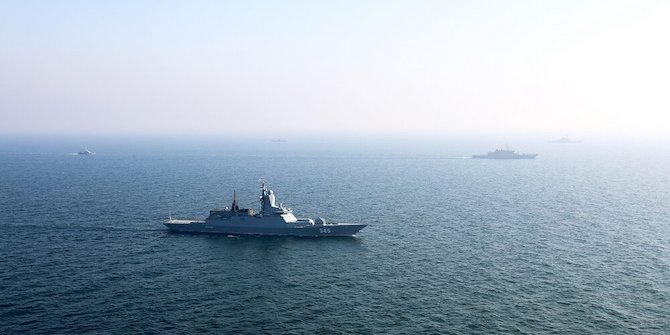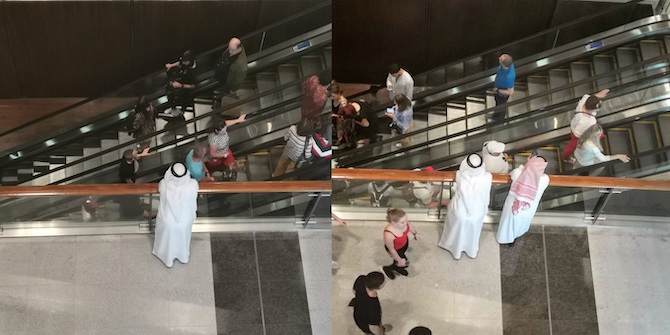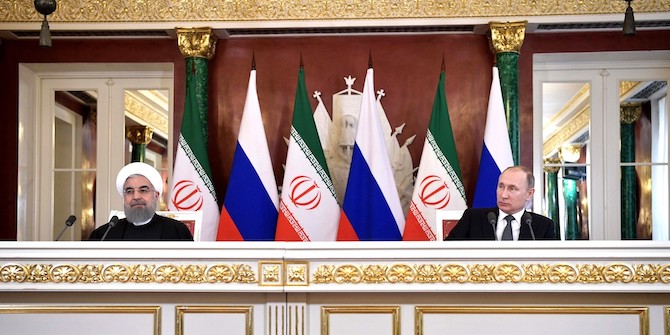by Alexandra Gomes, Sharifa Alshalfan, Asseel Al-Ragam & Tanushree Agarwal

‘Kuwaitscapes’ is a card game developed from the LSE Kuwait Programme research project ‘Public Space in Kuwait: From user behaviour to policy-making‘ that aims at promoting a fun and engaged reflection and conversation about public space in Kuwait and those using it. The game allows children and adults to understand some of the challenges and opportunities facing Kuwait’s residential neighbourhoods and everyday life, and to reimagine public space through a game of cards.
The team was pleased to be able to launch the game in Kuwait, at a public event that took place at the Natural History, Science and Technology, Arabic Islamic Science and Space building at the Sheikh Abdullah Al Salem Cultural Centre (ASCC). The cultural centre was a perfect fit for the launch as the architectural buildings and playful design attracts a variety of visitors and engages with the urban context – a place where you can find interactive exhibitions that include spaceships, dinosaurs or to explore the human body. With the incredible organisational support of Nada ElGhossein and the Centre’s team, the ‘lab’ space was ready for the launch. It was a colourful, fun, and large room decorated as an experimental lab, but with the flexibility and adaptability to be the set of the event. The tables and coloured sofas were arranged in sets of six allowing participants to organise themselves in groups and play Kuwaitscapes, with the space matching the informality and colourfulness of the card game.
Despite a sandstorm – a climatic event that is happening more frequently in the last decade in this part of the world – we managed to hold the event and to attract a number of children and their parents. This group helped promote one of the more special workshops that the Kuwaitscapes team has co-organised. A second challenge was the language of the cards and slides prepared for the launch (all in English), that limited the participation and engagement of children and adults that do not speak English.

One of the main aims of the event was to create a fun and engaged session with the participants (more than half of them children) that could help them understand the full context of the research ahead of playing the game. Having that in mind the event was divided into three main phases. The first phase began before the workshop started and while participants were arriving; the second explained the context of the game; and the third was where everyone began to play.
While waiting to start, participants were asked to engage with the research underpinning the game of cards, and to draw their own ideas for what they thought was missing in Kuwait’s streets. This allowed them to reflect on their own lived experiences. Participants drew trees, flowers, bikes and cycle lanes, and animals that were missing in Kuwait streetscapes. However, the dominant element of all drawings was people: people walking, running, and randomly meeting in public space (the aspiration of a young teenage girl). This reflected the feeling that the streets of Kuwait are missing people, the basic ‘element’ to make streets safer and livelier. These drawings were then affixed on a white board where they were left until the end of the event so that anyone could revisit them at any point during the event.

In the second phase of the event, the team engaged with the audience through a presentation which combined photos and questions directed to them. This presentation allowed participants to discuss the challenges of Kuwait’s planning and urban design – such as its car-centric development, the impact of single-family housing in residential neighbourhoods, low public transport use (especially from Kuwaiti citizens), high motorisation rates and the impact of cars on street occupation, walkability, health and climate change. Questions included:
Who came here today by car or taxi, and why?
Where do you walk more: on the streets of Kuwait, or in shopping malls as the Avenues, and why?
These questions led some of the younger participants to join the adults in a debate that including issues such as the lack of street comfort, poor transport alternatives, lack of street safety, and the need for more creativity in public space design. One of the participants raised the COVID curfew in the discussion to illustrate the need for a change in Kuwait’s urban development:
‘It seems that the car dominates the neighbourhood rather than the residents. We all remember when we had the lockdown, when we had two hours to walk around… I think it was the first time I saw my neighbours and got to know them. And I think that every neighbourhood in Kuwait still misses that’.

This discussion was followed by the introduction of the Public space in Kuwait research through a series of images comparing streets in Kuwait with other international streets (e.g. in Paris) with the title ‘why did we look into public space in Kuwait?’. This phase finished with the introduction of the card game Kuwaitscapes, its aims, strategy and an introductory video.
The third and last phase of the event was dedicated to playing the game. Each group of participants was given a set of cards and provided with step-by-step rules of the game, until they were able to play themselves. Tables with only children, with only adults and a few that combined the two were used to promote different types of engagement between participants and the game. This also allowed participants to recognise and engage with some of the elements and challenges discussed in the previous phases of the event while reimagining public spaces, using the different tool cards.

The event finished by giving away cards to all the attendees and an engaged post event chat between the different groups of participants, where further ideas were exchanged about spaces for children, healthy living, and public transport use. Future potential collaborations were some of the promises made at the end.
This was a unique event, one that made the team reflect on methods of public engagement, in particular with children. We have learned that the space informality, flexibility, and design are important; short and engaged times of communication are more adequate; drawing can be great as a form of self-expression; and finally, that the use of visuals (e.g. photos) and questions allow a wider engagement in discussions and are fundamental to the success of an event like this one. Language was a barrier that unfortunately was not possible to address at the time.
The Kuwaitscapes team wants to acknowledge and thank Nada ElGhossein and the ASCC team for their support in helping us launch Kuwaitscapes and for making this event happen after so many challenges. A special thanks to Jana, Mohammad, and Yousef Alkheshnam and Aziz Alsabih for their engaged presence and support at the event and with the participants. Finally, the team also appreciates the presence and engagement of all the participants including public space and transport activists and creative actors such as Jassim Al-Awadhi from Kuwait Commute, Dr Ghassan Al-Othman, Samia Alduaij and Architect Sura Saud AlSabah, among others.
The Kuwaitscapes game is now fully translated into Arabic and available to download. This is the second in a series of posts about the Kuwaitscapes game and its uses, looking at how creative thinking and an understanding of the city can inspire game and design-based interventions to make Kuwait’s public space more welcoming to all. Please follow #Kuwaitscapes on social media for updates! Read the introduction here, and see other pieces below. Photo credits: Alexandra Gomes
In this series:
- Public Space Use in Kuwait: From User Behaviour to Policy-Making by Alexandra Gomes, Asseel Al-Ragam & Sharifa Alshalfan
- Reimagining Public Space Through Cards in Kuwait by Alexandra Gomes, Sharifa Alshalfan, Asseel Al-Ragam & Tanushree Agarwali
- Hacking Kuwaitscapes by Alexandra Gomes, Sharifa Alshalfan, Asseel Al-Ragam & Tanushree Agarwal






